

Img spear phisher. Hacker (computer security) Scam (disambiguation) Understanding your equipment. In the last section, we identified your digital equipment as a potential threat.

Information Security. Information Security: With CPJ Internet Advocacy Coordinator Danny O’Brien Information security means defending your data, from research notes to the confidential details of your contacts, from basic details of your itinerary to audio and video files.

It means protecting data that is private to you, as well as protecting the privacy of communication between you and your colleagues or sources. Spear Phishing: What It Is and How to Avoid It. Introduction The latest twist on phishing is spear phishing.

No, it's not a sport, it's a scam and you're the target. Scam (disambiguation) Malware - Wikipedia, the free encyclopedia. Malware, short for malicious software, is any software used to disrupt computer operation, gather sensitive information, or gain access to private computer systems.[1] Malware is defined by its malicious intent, acting against the requirements of the computer user, and does not include software that causes unintentional harm due to some deficiency.
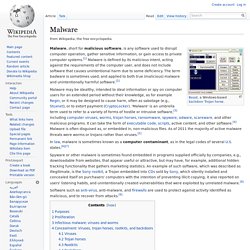
The term badware is sometimes used, and applied to both true (malicious) malware and unintentionally harmful software.[2] In law, malware is sometimes known as a computer contaminant, as in the legal codes of several U.S. states.[6][7] Spyware. Spyware is software that aids in gathering information about a person or organization without their knowledge and that may send such information to another entity without the consumer's consent, or that asserts control over a computer without the consumer's knowledge.[1] Whenever spyware is used for malicious purposes, its presence is typically hidden from the user and can be difficult to detect.
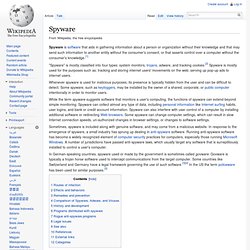
Top 7 Phishing Scams of 2013. In 2013, global volumes of phishing emails* dropped significantly compared with 2012.

This is great news: users have become more savvy to the signs of mass phishing. Also, adoption of email authentication standards DKIM, SPF, and DMARC have begun to hamper spammers’ ability to pose as trusted brands. Internet safety. Information security[edit] Sensitive information such as personal information and identity, passwords are often associated with personal property (for example, bank accounts) and privacy and may present security concerns if leaked.
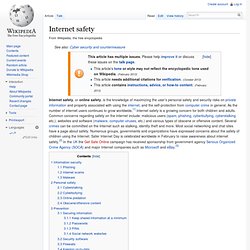
Unauthorized access and usage of private information may result in consequence such as identity theft, as well as theft of property. Common causes of information security breaches include: Phishing[edit] Internet safety. Telephone tapping. Legal status[edit] Telephone line control device "Jitka", used in late 1960s by Czechoslovakian StB to signal line occupancy, and connect a recorder In the United States, under the Foreign Intelligence Surveillance Act, federal intelligence agencies can get approval for wiretaps from the United States Foreign Intelligence Surveillance Court, a court with secret proceedings, or in certain circumstances from the Attorney General without a court order.[6] Under the law of the United States and most state laws, there is nothing illegal about one of the parties to a telephone call recording the conversation, or giving permission for calls to be recorded or permitting their telephone line to be tapped.

However the telephone recording laws in most U.S. states require only one party to be aware of the recording, while 12 states require both parties to be aware. It is considered better practice to announce at the beginning of a call that the conversation is being recorded.[7] Surveillance. Surveillance (/sərˈveɪ.əns/ or /sərˈveɪləns/)[1] is the monitoring of the behavior, activities, or other changing information, usually of people for the purpose of influencing, managing, directing, or protecting them.[2] This can include observation from a distance by means of electronic equipment (such as CCTV cameras), or interception of electronically transmitted information (such as Internet traffic or phone calls); and it can include simple, relatively no- or low-technology methods such as human intelligence agents and postal interception.
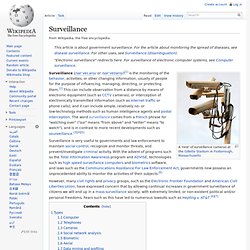
The word surveillance comes from a French phrase for "watching over" ("sur" means "from above" and "veiller" means "to watch"), and is in contrast to more recent developments such as sousveillance.[3][4][5] Surveillance is very useful to governments and law enforcement to maintain social control, recognize and monitor threats, and prevent/investigate criminal activity. Types[edit] Computer[edit] Telephones[edit] Phone hacking. Phone hacking is the practice of intercepting telephone calls or voicemail messages, often by accessing the voicemail messages of a mobile phone without the consent of the phone's owner.
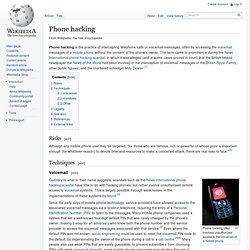
The term came to prominence during the News International phone hacking scandal, in which it was alleged (and in some cases proved in court) that the British tabloid newspaper the News of the World had been involved in the interception of voicemail messages of the British Royal Family, other public figures, and the murdered schoolgirl Milly Dowler.[1] Risks[edit] Although any mobile phone user may be targeted, "for those who are famous, rich or powerful or whose prize is important enough (for whatever reason) to devote time and resources to make a concerted attack, there are real risks to face.
"[2] File:Motorola L7.jpg. Phishing. An example of a phishing email, disguised as an official email from a (fictional) bank. The sender is attempting to trick the recipient into revealing confidential information by "confirming" it at the phisher's website. Note the misspelling of the words received and discrepancy. Also note that although the URL of the bank's webpage appears to be legitimate, the hyperlink would actually be pointed at the phisher's webpage. A phishing technique was described in detail in 1987, and (according to its creator) the first recorded use of the term "phishing" was made in 1995 by Jason Shannon of AST Computers.
The term is a variant of fishing,[8] probably influenced by phreaking,[9][10] and alludes to "baits" used in hopes that the potential victim will "bite" by clicking a malicious link or opening a malicious attachment, in which case their financial information and passwords may then be stolen. 20 ways to keep your internet identity safe from hackers. We're high up in the Gherkin in the City of London and Garry Sidaway, director of security strategy at Integralis, a firm which advises government agencies, pharmaceutical and financial services multinationals, is giving my computer a security MOT.
"You don't have anti-virus software, I see," he says, a trace of mockery in his voice. "That's your first mistake. " According to Sidaway, while most of us are much more aware of the risks now ("My mum shreds her documents even if she doesn't know why," he says), we should all be raising the bar. He thinks we Britons are an overly trusting lot. Sitting ducks for an armada of hackers, who are every bit as focused on stealing our data as we are relaxed about storing it. So what are they after, I ask? The government estimates that the total cost of cybercrime in the UK is £27bn a year. 1. 2. 3. 4. 5. 6. 7. 8. 9. 10. 11. 12. Thinking about having one for your bank and other financial accounts, another for shopping and one for social networks. 13.